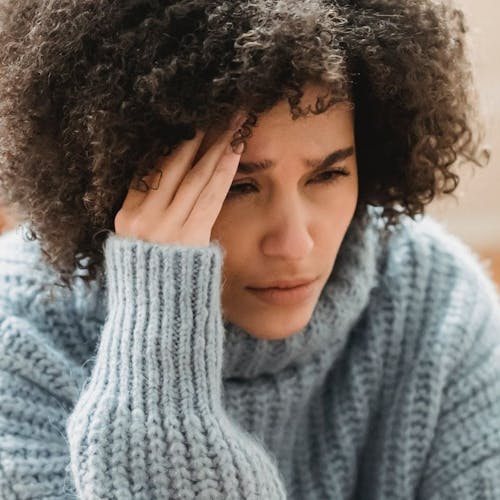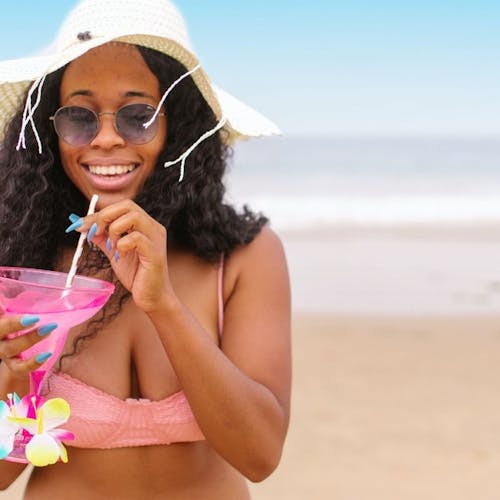This website uses cookies to enhance the user experience. By using Yoppie you are agreeing to our use of cookies.
How To Survive Your Hot Flashes In Summer
Written by Yoppie
07 Jul 2020
First off, know your triggers
Avoid caffeine
Stay cool
Reduce stress and anxiety
Wear loose fitting layers
Keep a cold compress handy
Fan it out
Summer is the time of year everyone looks forward to, but if you’re suffering with menopause symptoms? It can be, well, a trying time, to put it mildly. That’s all thanks to hot flashes (sometimes called hot flushes).
According to Harvard Health Publishing, up to 80% of women going through menopause experience these hot flashes, which are also known as vasomotor symptoms. They can manifest as a sudden sensation of heat in the chest, face and head, accompanied by flushing, perspiration, and sometimes even chills.
Alone, hot flashes can be frustrating enough, but add warm weather into the mix and things can get pretty sweaty. Here are some solutions you can try to lessen the intensity of your hot flashes and keep your cool all summer.
First off, know your triggers
Hot flashes occur due to changes in hormone levels during menopause, and everyone’s symptoms are unique. Understanding the most common hot flash triggers and which ones you suffer from most can help you prepare. These could be the likes of:
- Drinking hot drinks like tea, coffee or hot chocolate
- Eating spicy food
- Drinking anything that contains caffeine or alcohol
- Taking a dip in a hot bath, hot tub, or sauna
- Sitting directly in the sun instead of the shade
- Smoking
- Stress and anxiety
Once you have identified a few things you can cut back on in your daily routine, monitor any changes so you know if you need to cut them out altogether.
Avoid caffeine
One of the main things to watch out for is your caffeine intake. Hot flashes can happen at any time, but they’re particularly taxing in the evening, and it’s easy to reach for a coffee to perk you up after a night of tossing and turning. However, this can be a slippery slope since excess caffeine only leads to more sweating. To avoid this, stay clear of anything with caffeine after around 3pm in the day, and choose decaf options instead.
Caffeine tends to peak in the blood after 30-60 minutes of drinking, and stays in your body for hours after, so the earlier you can stop drinking it the better. Plus, watch out for snacks that may also contain caffeine, like dark chocolate!
Stay cool
… especially in the evenings. Night sweats are common during menopause, so keep your bedroom temperature cool, wear loose fitting pyjamas made from breathable materials, and consider keeping a handheld fan by your bedside in case you need a quick-fix cool-down during the night. You may also wish to switch to a lightweight duvet, and a silk pillowcase for added chill.
Reduce stress and anxiety
In a cruel twist of fate, the more you stress out about hot flashes, the more intense they can become. Practise deep breathing and mindfulness exercises to reduce anxiety in the lead up to a hot flash, so as not to make it worse. We love the free Instagram Live sessions from breath coach James Dowler - check them out here!
Wear loose fitting layers
Your fashion choices may be contributing to your hot flashes, so consider switching to loose fitting clothing, and anything that can be layered. When you start to feel the effects of an oncoming hot flash, remove some of the layers to cool down your body - a simple but effective method that is often forgotten.
Keep a cold compress handy
If you want to cool down in a hurry, it’s a great idea to keep an ice pack and tea towel in the freezer ready to pop on your wrists, the back of your neck, and anywhere else you feel you need to cool down. Ahh, bliss!
Fan it out
A battery operated, hand-held fan could be your tiny electronic saviour if you suffer from hot flashes in summer! There are some really handy small ones available now, and by making sure you always have one in your handbag you can calm any fast-approaching flashes before they become overwhelming.
Remember, if hot flashes have a significant effect on your life, you can speak to your doctor about treatment. The most common treatment for menopausal symptoms, including hot flashes, is hormone replacement therapy, otherwise known as HRT. Other non-hormonal treatment options are also available such as other medications, herbal remedies and psychological therapies.
Have you experienced the stress of hot flashes? Have you discovered any top tips for staying cool, especially during summer? Let us know over on Instagram @itsyoppie. Don't forget that our personalised period subscription box can get organic cotton tampons, PMS supplements, and much more, delivered easily and regularly through your letterbox. That's a bit less to worry about when you're trying to keep it cool...
Fact checked by Doctor Samantha Miller.
Section jump
Back to top
Subscribe To Our Newsletter
YOPPIE





© 2026 Yoppie is a registered trademark of Phlo Technologies Ltd.
Yoppie's supplements are not a substitute for a varied diet and healthy lifestyle and are not intended to diagnose, treat, or cure any disease. If you are pregnant, breastfeeding, have a medical condition or are under medical supervision, please consult with your doctor before taking any of our products.






